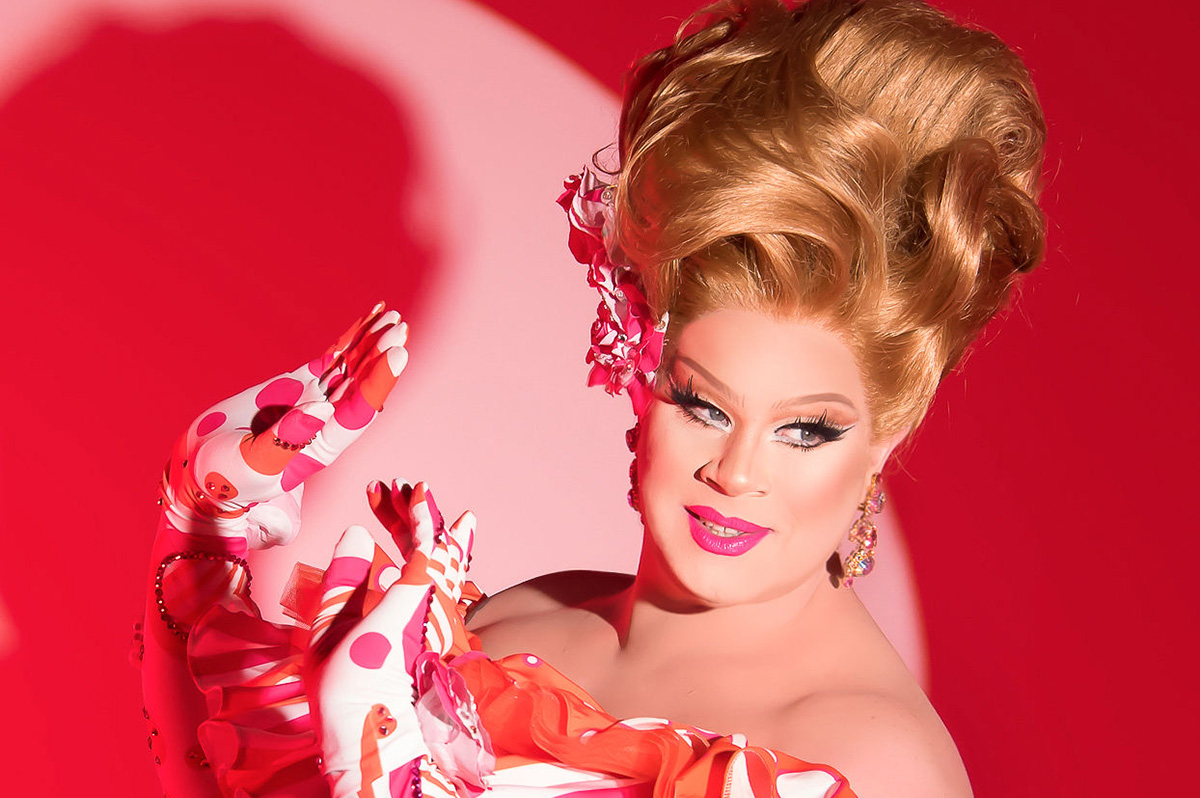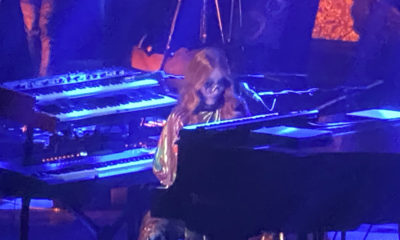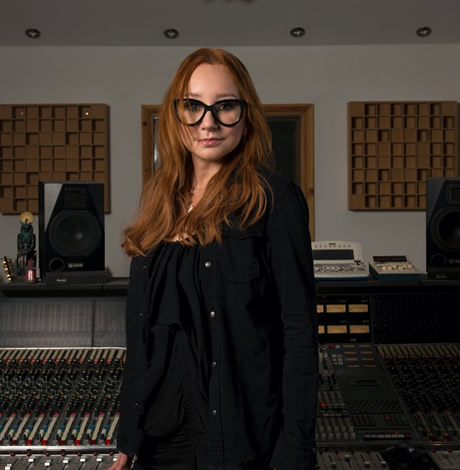Arts & Entertainment
Girl reappearing
Tori Amos celebrates 20th anniversary by revisiting her catalogue

Tori Amos is straight but has a strong LGBT fan base. The Blade’s Joey DiGuglielmo is a long-time fan, having worn out a copy of “Boys for Pele” in the throes of closeted college-era angst. He talked to her by phone two weeks ago to talk about her new album “Gold Dust,” which features orchestral re-workings of 14 of her songs. It’s slated to drop Tuesday in the U.S.
Blade: Hi Tori
Tori Amos: Hi, how are you?
Blade: I’m good. I’m gonna try to cover a lot of ground really quickly so I’m just gonna jump right in. Tell me a little about the relationship you have going with Deutsche Grammophon. This is your second project with them. Are you under contract or are you just doing things on kind of an album-by-album basis?
Amos: Kind of album by album. … They came up with the idea of the variations on the masters (last year’s “Night of Hunters” album) but when I’d been working with the Metropole Orchestra the year before and they basically said, “We need recordings of this. This is the 20th anniversary of your work and this is how you do it with an orchestra.” I didn’t know, at first, if that made sense, but it seemed to make sense in their German minds. So it’s been very organic.
Blade: I’m just wondering how some of these arrangements came about and thinking back to some of those great remixes you had of your stuff back in the late ‘90s. Obviously I know remixing is a whole different thing altogether, but in terms of crafting symphonic arrangements or reworkings of your songs — where these songs are very much living in an alternate space from their original studio versions — I’m wondering if any of the same artistic considerations or principles apply as would if you’re crafting an alternate version in the form of a remix.
Amos: Wow, that’s a great question. I guess the thing about a remix is you don’t have to retain the narrative or even the spirit of the original work in the same way. So the “Professional Widow” remix, for example, became a very different expression of the song from the original. Some of that narrative was there but not the way it was on the (album version). And yet the remix still clearly did its job. But in doing something like this, you don’t want to lose the song’s story or her narrative in any way, so it was important to really, and sometimes very subtly, make changes. Some of the songs didn’t want a makeover. Some of them said, “Only strings,” or others said, “We’re open to a full orchestra but we don’t want to become completely overtaken.” It was almost like you were changing their outfit, but you were not changing their soul. Some were open to a more radical flavor. Like with “Flavor,” for instance, which was originally recorded with loops, it really stepped forward and said, “I want a completely different approach.” Or with “Precious Things.” It kind of said it thought its narrative could work with a more Prokofiev-inspired approach.
Blade: What was the time frame for this album?
Amos: I was rehearsing (with the Metropole Orhestra) for shows in October, 2010 and then we got back together in early 2011 and began recording some, but then we put it away because we went and did “Night of Hunters” with the octet. So that project came first, even though this was the first idea. Then we put the (“Gold Dust”) reels back on, I’d say maybe January 2012 and … began editing them together. Overdubs and mixing were finished in July.
Blade: Classical musicians can be notoriously snobby. Did you get any vibe from the Metropole players, even if they never said anything, that they were thinking, “Why are we doing this — can’t somebody bring us some Beethoven or something?” You do all kinds of stuff, obviously, but the grand scheme of things, your songs would be considered in more of the pop idiom than classical.
Amos: It was really a collaboration with them and I think the reason Alex (Burh, the Deutsche Grammophon exec who suggested “Night of Hunters”) suggested it is because he could tell there was a real conversation happening during the rehearsals (for the 2010 concert). There was definitely an affinity and a back-and-forth-type thing that was going on and I think that was why the decision was made to document and record it. There was a chemistry.
Blade: You’ve done a few theme projects now — a holiday album, some concept albums, a classical album, now orchestral reworkings of your songs. Do you have a private bucket list of stuff you want to eventually do? I’m not even necessarily asking what all those projects might be, but do you think, “Well, before I hang up my hat, I definitely want to do — blank.” Does your artistic mind work that way?
Amos: Yes, it thinks that way. I think right now I’m really focused on the musical, “The Light Princess.” Nick Hytner is very much a powerful force at the National Theatre in Great Britain and so hopefully the plan or the idea is that the piece will be ready to get put on its feet within, oh I don’t know, a year, maybe a little over a year. That’s what I have on my brain right now. But yeah, I approach things as a conceptualist and there are all kinds of thoughts that have come into my mind. I would love to someday do something where I just stay someplace and perform. I don’t know if you’d call it an evening in Las Vegas or what, but with a story and dancers. I would love to do something at Caesar’s Palace someday. And not just campy, you know, but maybe a bit of camp, but I love the idea of having dancers — not me dancing, I would be playing and singing — but have some dancers onstage and just make it an incredibly entertaining evening. Very much an old-school variety show with great costumes and an old Hollywood feel. Something like from the ‘30s or ‘40s where you get dressed up and come to a show and have dinner and walk away feeling like you’ve had a really glamorous evening.
Blade: Well, I would definitely come see it, that sounds fun. One thing I’ve always really admired about you is that you don’t always make things easy on the fans or present the material in such a way that it’s easy or accessible for the most casual fan, to say nothing of the material itself. I’m talking about things like those Icon or Playlist anthology CDs where they throw them together for all kinds of artists and make them something that’s meant to be a $7.99 impulse purchase in the checkout lane at Target. You never do things like that. And I’m not even saying it’s necessarily a bad thing ….
Amos: (interjects) … It is bad.
Blade: OK, why? Couldn’t you argue that it might pique someone’s curiosity and inspire them to then go dig deeper?
Amos: I’m telling you, it’s sinning against your art. That’s what you’re doing. It’s lazy.
Blade: Do you have business people approach you with these kinds of ideas?
Amos: Well, you know. There are all kinds of ideas that get spun about. But you have to have it in your head whether it’s a good idea or not. How are you going to feel about it in three months, in six months? What kind of statement does it make about you as an artist? And hey, sometimes I understand why they release these anthologies because something like (“Gold Dust”), I mean this takes a LOT of time to do. We started October 2010 so we’re talking two years from inception to this. It started with them inviting me to come play a show but it didn’t matter if it was one show or 200 shows or if we recorded the arrangements or not, the work still had to be done. The arrangements still had to be made for, like, 20 songs. (Arranger) John Philip Shenale and I were in touch everyday about this for one show, which is all I initially thought it was going to be. Not for one second did I think this would end up being a studio album. They invited me for this before the Alex, the German musicologist, invited me to come start messing with the masters. So that was the genesis and the time frame and doing a project like this with an orchestra is really tricky because people have attachments to the original versions. You really want to retain the soul of the song girl and like I said, some didn’t want extreme makeovers. That wasn’t really the challenge. It’s not about trying to shock people or try to decide how different you can make it. That’s almost too easy. It’s easy to shock people that way, to turn something totally on its head. I think what’s much trickier to do is to subtle because subtle changes can also become real banal and lifeless if you’re not careful.
Blade: I interviewed Sophie B. Hawkins a few weeks ago, who has a fabulous new album out by the way. I highly recommend it. I’m wondering if you feel any sense of sisterhood or artistic kinship with other women who came along in the ‘90s about the same time you did. You’ve managed to continue to forge ahead against the odds, while so many artists from that time have seen their audience dry up or move on. What advice would you give to other women who are highly talented musicians and still feel they have something great to offer?
Amos: It is really tough out there and it’s culturally tough because the masses seem to be gravitating to the next people and artists are seen as very disposable. They want to move on to whomever is next instead of growing with them. I have always wanted to grow with the artists and jump on the train with them. I wanted to know what they were experiencing and wanted to be seen as their patron. That’s how I think of my audience — I very much see them as my patrons, the people who come to my shows. Because without them, I couldn’t keep going. Also, philosophically, people seem to be of the mindset often, that it’s OK to just take something. I would never go to a wine show and slip a bottle of wine in my bag when the vendor wasn’t looking but people have talked themselves into thinking that that’s OK. Meanwhile orchestras are shutting down and you have … very accomplished musicians thinking about how they’re going to make a living doing their art. This is what I’m hearing from a lot of musicians. Do I have an answer? No, I don’t. I think it’s a cultural crisis.
Blade: Isn’t it partly short attention spans too?
Amos: Well yes, that and not wanting to grow. I would like to say that eventually people will realize how sad it is and that it will turn itself around but one of the reasons for the short attention spans is these shows where the next crop is waiting in the wings for its 15 minutes. These shows are making a lot of money but they don’t care about these singers. All they care about is the next show. Nobody is nurturing these artists.
Blade: A lot of people tape your shows and trade them around. Are you OK with that as long as they’re not trying to profit off them? Say they couldn’t make it to the show in Denver and you did this new song — which has always been one of the cool things about you, that your set list changes all the time.
Amos: I don’t have a problem with that but please, use good mics! Now obviously, if you’re trying to sell it, then I have a problem. I think my community knows how it goes. They know where I stand on stuff like that. I’ve even had people tell me they knew somebody who fell on hard times and couldn’t go to one of the shows. OK, but one day when you can, give back. I support the arts. Like visual artists — I go to galleries and support artists all the time.
Blade: I have a somewhat self-indulgent question I’m gonna squeeze in here but maybe it will apply to some other fans too. I play in a church so the challenge really becomes digesting so much new music all the time. What advice would you give to a church pianist or organist where there’s never time to polish anything or let it settle into the brain or fingers before you’re onto the stuff for next Sunday?
Amos: I think you should all be revisiting things on some kind of a rotating schedule. So maybe you revisit something, say, three months later and it becomes part of your repertoire and that way you develop a repertoire. I don’t think things just have to be performed one time. People will say, “Oh, I recognize that, I like that piece.”
Blade: I guess the cynic in me thinks they’ll think, “Oh, that again — he must have had a busy week.”
Amos: Well, OK, I guess some might think that but you can’t lie to yourself. The only other thing you can do is carve out more rehearsal time for yourself, but yeah, I can imagine it is tough.
Blade: Are you a keeper by nature? Do you have clothes from old video shoots and, like, all the “Doll Posse” wigs and stuff like that?
Amos: Yes, I have all that. And yes, (daughter) Tash dresses up in them all the time.
Blade: How many pianos do you own?
Amos: Well that’s tough to say because I have a deal with Bosendorfer so I can trade them out.
Blade: I can’t imagine what your tuning bill must be.
Amos: Well, we have different tuners in different countries. The Bosendorfer at the beach house in Florida, we have this lovely lady who has this twinkle in her eye. And then there’s the one where we record in Cornwall. But Ann has gotten the Florida one where it doesn’t need as much because it’s not being recorded. She’s really got it stable right now and it’s not being moved, so it tends to hold its tuning pretty well. When we’re recording, we tune once a week.
Blade: I love the new album, thanks so much for your time.
Amos: You take care honey, thanks.
Sports
Trans cyclist’s victory sparks outrage in conservative media
Katheryn Phillips is originally from DC

On the heels of UPenn erasing the record of the first openly transgender NCAA Division I All-American swimmer and the U.S. Supreme Court’s decision to tackle bans on trans student-athletes, right wing media is now all hot and bothered about the latest trans woman who won a cycling championship — even though she competed according to the rules.
On Tuesday, 58-year-old Katheryn Phillips finished first in USA Cycling’s Lyons Masters National Championship race for women aged 55-59, with a time of 1:42:10, according to the official results posted by the organization. The record shows her gender as “F” for female.
One second behind Phillips was Julie Peterson, with a time of 1:42:11 — as were three other cyclists: Mary Beth Grier, Andrea Cherniak-Tyson, and Carolyn Maddox.
Peterson, 57, was so outraged, she told Fox News she refused to stand on the podium in second place next to Phillips. Her story was swiftly shared by the New York Post (also owned by Fox’s parent company News Corp.), the Daily Mail, Breitbart, and other conservative media.
Both Peterson and another competitor are accusing USA Cycling of “hiding” that a transgender woman had registered to race.
“It was hidden from us. Katheryn Phillips, KJ’s name, was not on that list. And I checked it up all the way to the point of closure when we couldn’t register online anymore,” Debbie Milne told Fox.
“If I had known, I wouldn’t have spent thousands of dollars in travel and time off work to come and do a race,” Peterson said. Fox welcomed Milne, 56, who finished seventh on Tuesday, to Fox & Friends Thursday morning.
(Video courtesy of Fox News)
Peterson told Fox she did complain to USA Cycling officials prior to the race. Both Milne and Peterson referred to Phillips as a male, and with “he/him” pronouns.
“To be fair to all humans, if we want to say ‘him’ or ‘her,’ he was born a biological male, that is a fact,” Milne said. “And that is the thing that makes it an unfair advantage. Whatever has happened after that is a whole different topic.”
“I said, ‘I don’t want to race against a man,’ and they quickly scolded me and said ‘Oh, you can’t call him a man,’ and I’m like ‘Well, he is a man,’ so I was quickly scolded and corrected that it is a woman and I don’t even know what to say.”
USA Cycling did not respond to the Washington Blade’s emails requesting comment.
Phillips, who goes by Kate and by “KJ,” is a former rugby player with the D.C. Furries, who stated in the comments of a 2024 article published by Zwift Insider that she was the first out trans athlete in the U.S. to compete under the 2004 International Olympic Committee’s guidelines on trans participation.
“When USA Rugby told me about the IOC decision in 2004, I raised my hand to be included. I experience nothing but joy when I play, ride, and race,” Phillips said.
As the Blade has reported, the International Olympic Committee drastically revised those rules in 2021, and in March, Republican lawmakers in D.C. demanded the IOC ban trans female athletes from women’s sporting events altogether.
The Blade also reached out to Phillips for comment but as of press time we have not received a response. She told Zwift Insider in March 2024 she does not let those who disapprove or spread hate impact her performance or her attitude.
“I am unaffected by dissent. I love, I share joy, I am me, and I have been my authentic self for decades,” she said. It’s been reported Phillips came out in 1999, and told Zwift Insider she considers herself a lifelong cyclist.
“I’ve been on a bike for as long as I can remember,” said Phillips. “As kids, my friends and I rode all over town, we were feral kids; no cell phones, no trackers … we just roamed, and nobody got in trouble or hurt bad enough not to ride home … Scrapes/bruises/cuts were not an issue for us. In my teens, I worked for myself as a court/legal messenger, doing all of the work via my bike until I got a car. Raced BMX as a kiddo (when I mowed lawns to cover the race entry fees), I did MTB stuff (non-racing) and Sprint/Olympic Triathlons in my 30’s, and now I’m racing on Zwift, Road/Gravel, and CX in my 50s.”
In the comments section, Phillips made clear she’s not competing to win.
“I don’t do sports for victory, I do it because like many other women, I am an athlete to my core,” she said. “Unlike some, I am not there to WIN, I am there to do my best with the competitors and teammates I have around me trying to do the same…we are in it for the experience. I rejoice in their wins, and a lot of joy is reflected back to me when I have a good day.”
Celebrity News
Nina West’s ‘Sugar in the Tank’ tour comes to Rehoboth Beach
Drag Race’ contestant will be at Clear Space Theater Company on July 6

Nina West, a drag queen known for competing on “RuPaul’s Drag Race,” is currently on her ‘Sugar in the Tank’ tour around U.S. cities.
With previous shows in Key West, Fla., New York, and hometown of Columbus, Ohio, the tour is staying put in Provincetown, Mass., from late July to early September. It will make a stop at Clear Space Theater Company in Rehoboth Beach, Del., as part of a summer cabaret series on July 6.
Andrew Levitt has been performing as Nina West for 25 years, who got her rise from starring in “Drag Race” Season 11, where she placed sixth and won Miss Congeniality, a title awarded to the contestant who is regarded as the kindest and most helpful one of that season.
West has toured “Hairspray” on Broadway as Edna Turnblad, starred in a couple of feature films and published a children’s book titled ‘The You Kind of Kind.’
Levitt said he wrote this show in response to attacks from the government towards the LGBTQ community.
“‘Sugar in the Tank’ is a big old gay fabulous summer musical,” Levitt told the Washington Blade. “The show is a response to the darkness that I think has fallen over a lot of people in the country and it’s hopefully trying to bring a little bit of light and a little bit of joy.”
“Sugar in the Tank” is a Southern euphemism for gay, often holding a negative connotation. Levitt said he wanted to “reclaim and embrace” queerness in times when some people want to take that away.
Levitt said he knew he would be traveling to predominantly queer destinations like Key West and Provincetown for these shows and that was always at the forefront of his mind when writing “Sugar in the Tank.”
This will be Levitt’s first time in Rehoboth Beach. Clear Space Theater is considered Delaware’s second-largest professional non-profit theater and the state’s most prolific producer of professional theater. The space seats just 170 patrons and Levitt said he loves the intimacy of a small venue and that it’s his favorite way to do a show.
“Stages like this size are the perfect size for me because it allows for me to really showcase my talents,” Levitt said.
Levitt founded the Nina West Foundation in 2015 to uplift and sustain the central Ohio LGBTQ community, which has raised more than $3 million for various organizations. He said he makes activism part of the entertainment in his career.
“That’s the nuance of what drag is. We can be ridiculous for fun and we can be serious but it’s all wrapped up into one thing,” Levitt said. “I think that can be the power of it.”
Levitt said West is so much more confident now than when he first started performing as her. He didn’t know where his voice belonged in the community in the past, but because of those who came before him in this art form, he has learned to harness the power of the stage and the power of the wig to be able to tell stories.
“I really love my community. I love queer people. I love who we are and what we represent,” Levitt said. “Knowing our history and knowing that we’ve been through a lot, I’m really thrilled that as a queen, I can use my voice and my platform to help try to better our community, not try to speak for everyone but try to lend voice to people who desperately need it.”
Levitt’s advice to young queer artists is to not give up on yourself, surround yourself with supportive people and allow yourself the opportunity and space to fail, to ask questions, and to not give up.
“Our young people have got to be told they matter,” Levitt said. “Oftentimes, people are told that they don’t matter, that their voice doesn’t matter, that they cannot make a difference and I want to remind every single person who’s doing this that they do matter, they can make a difference, their voice is intrinsic to who we are as a community.”
If Sugar in the Tank was a drink, it would be a Bahama Mama or Sex on the Beach, said Levitt, because they are delicious, juicy, and sugary, just like the show.
“I just want everyone to know that they should come to ‘Sugar in the Tank’ and experience a show that’s built on joy and levity and silliness and fun and come have some fun with me and show me the fabulous love of Rehoboth Beach,” Levitt said. “I can’t wait.”

The Rainbow History Project will host “Pickets, Protests and Parade Exhibit Tour” at 7 p.m. at Freedom Plaza. This event honors the courage, resilience and resistance of D.C.’s gay community. For more details, visit Eventbrite.
Go Gay DC will host “LGBTQ Community Social” at 7 p.m. at Hyatt Centric Arlington (1325 Wilson Blvd.). This fun event is ideal for meeting new people and community building. Attendance is free and more details are available on Eventbrite.
Xavier Entertainment DC will host “Cowboy Carter Afterparty” at 10 p.m. at Nellie’s Sports Bar. There will be fireworks, parades, and patriotic fun. For more details, visit Eventbrite.
Mezcal Amaras will host “Sha Boing Boing Showdown” at 6 p.m. at Snappy’s Small Bar (3917 Georgia Ave., N.W.). Get ready to test your hotdog eating abilities. Tickets start at $12.51 and can be purchased on Eventbrite.
Illusions Drag Queen Show will host “Drag Queen Dinner Show” at 7 p.m. at 2323 18th St. N.W. Guests will be treated to the very best celebrity drag impersonations in entertainment. Tickets start at $12.97 and are available on Eventbrite.
Thurst Lounge will host “A Thirsty Cowboy Afterparty” at 5 p.m. DJ Apollo will be performing. For more details, visit Thurst’s website.
9:30 Club will host “Gimme Gimme Disco: A Dance Party Inspired by ABBA” at 9 p.m. The DJ will play plenty of disco hits from the 70s and 80s. Tickets cost $45.30 and can be purchased on Ticketmaster.


















